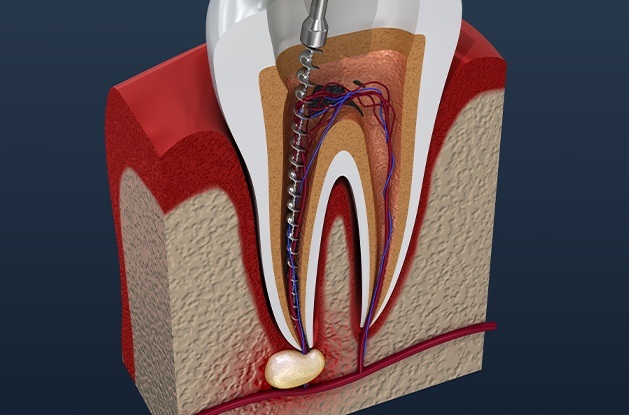Root Canal Treatment – Northampton, MA • East Longmeadow, MA
Fast & Gentle Relief for Toothaches
Anytime a tooth sustains an injury due to decay or a fracture, there is always the possibility that the tooth will need a root canal. Although just seeing those words can incite panic in some patients, you can have peace of mind knowing we’re here to make the entire treatment process as seamless, comfortable, and stress-free as possible. So, you have nothing to fear! If you have any questions or concerns, you’re more than welcome to get in touch with us to schedule a consultation. You can also read on to learn more about this emergency dental service.
Why Choose EMA Dental for Root Canals?
- Same-Day Emergency Appointments
- Experienced Team That Puts Your Comfort First
- Modern, State-of-the-Art Office
Do You Need Root Canal Treatment?

When a patient is experiencing constant pain and increased dental sensitivity, it is likely the tooth has sustained an irreversible pulpitis. An irreversible pulpitis is inflamed dental pulp or nerve tissue within a tooth that often leads to an abscess or a painful infection that occurs at the apex of the root. A consultation, a radiograph, and a conversation with your doctor will determine if you are a good candidate for this procedure, so make sure you schedule an appointment if you are experiencing any of the following abnormal dental symptoms:
- Persistent sensitivity
- Pain when chewing
- A pimple-like bump on your gums
- Dark discoloration on the tooth
- Red, inflamed, or bleeding gums
The Root Canal Process

The procedure will start with anesthetic to ensure a comfortable visit. Your doctor will work with an assistant to isolate your tooth using a dental dam to prevent contamination of the internal portion of the tooth. A high-speed drill will be used for a moment to open the biting surface of the tooth so the doctor can gain access to the internal area, or pulp chamber.
A series of small dental files will be used to remove the damaged, necrotic pulp tissue from within the tooth. Once the pulp has been completely removed, the root canals will be thoroughly irrigated with a sterile cleansing agent and filled with a permanent material called gutta percha. Gutta percha is a rubber-based filling material that will occupy the space where the pulp was. A soft, temporary material will be placed on the biting surface of the tooth, and you will be required to return to see your dentist for the next step; preparing the tooth for a crown.
Typically, root canal therapy can be completed in one visit, however, every circumstance is different, and some may require multiple visits. It varies from person to person and depends on the level of pain, infection, and how many roots are needing therapy. The good news is that there isn’t any recovery time following this procedure. We just ask you not to attempt any heavy-duty chewing until your anesthetic has completely worn off as there may be an opportunity for tongue or tissue injury.
The Benefits of Getting a Root Canal

Often, the only other option, once a tooth has developed irreversible pulpitis or a periapical abscess, is to extract or pull the tooth. Not only does this require a more extensive procedure and a longer recovery, but it also requires you to pay for a dental bridge, denture, or dental implant so the look, health, and function of your smile aren’t compromised moving forward. Fortunately, root canals allow you to keep your own natural tooth for years to come. Plus, they eliminate the infection, they alleviate any pain you’ve been experiencing, and they have an incredibly high success rate!
Understanding the Cost of Root Canals

Before you commit to root canal therapy, you should make sure that you understand how much you can expect to pay for the procedure. The final price will be different for each patient based on a variety of factors, which we can explain in more detail for you during your initial consultation. Rest assured that our team will always be transparent and honest about the cost of root canal therapy, and we’ll help you explore the financial options that can reduce the stress of paying for your care.
Root Canal FAQs
How Long Does Root Canal Recovery Take?
Although everyone’s situation in East Longmeadow is unique, most people can return to work or school the day following their procedure. However, if your job involves strenuous physical activity or labor, you may want to take a few days off to allow your gums to mend. Vigorous exercise can interfere with the recovery process by diverting blood containing necessary nutrients away from your teeth and gums.
You might want to stick to a soft food diet for a few days following your procedure, because you’ll likely be sore for a little while. Also, try chewing on the opposite side of your mouth to avoid triggering any additional discomfort. You can brush and floss as usual, but be gentle with your recently treated tooth.
How Much Pain is Considered Normal After a Root Canal?
You’ll be numbed for the procedure itself, so you probably won’t experience any aches until after the meds wear off. Then, you’ll likely feel tender for a few days, though it’s usually safe to address any swelling or throbbing with over-the-counter medications like Tylenol or ibuprofen.
Avoid overly hard or crunchy foods that can exacerbate your condition. If you experience pain that worsens or doesn’t dissipate after three days, contact our office so we can ensure you’re healing as intended.
How Should I Prepare for My Root Canal?
It’s a good idea to eat a healthy meal a couple of hours before arriving for your root canal because you’ll likely still feel numb afterwards, and might burn or bite your lips, gums, or tongue trying to eat anything. Also, avoid alcoholic beverages and tobacco products before your procedure because they can interfere with the numbing medication that’s intended to help you feel comfortable.
You might even take an over-the-counter medication, like ibuprofen or Tylenol, before you arrive so that it kicks in by the time our team begins working. We also recommend getting a good night’s sleep the night before because it can reduce anxiety and boost your immune system to reduce the likelihood of developing an infection.
How Long Does a Root Canal Take?
Usually, your root canal can be completed in a single appointment, though it can sometimes take two. First, we’ll update your medical history and place a temporary antibacterial medicine to the affected tooth to alleviate the ache. Then, we’ll schedule a procedure to clean the inside of your tooth and restore it.
The root canal treatment itself takes about 30 to 90 minutes, depending on the location of the tooth and the severity of your condition. Molars tend to take longer because they’re harder to access and contain more roots.
Why Do I Need a Root Canal if My Tooth Doesn’t Hurt?
Although pain is one of the most common warning signs of dental damage, it isn’t the only one. In fact, there are several other symptoms we keep an eye out for during your routine exams, including dark discoloration on the tooth and a pimple-like bump on your gums. If we do recommend a root canal, we will review our findings with you, answer any questions you have, and get to work creating your custom treatment plan.
What Happens if You Wait Too Long for a Root Canal?
Waiting a week or two to schedule your root canal won’t lead to much harm. Any longer than that, however, there’s a significant chance that the infection will kill the nerve before spreading to the surrounding teeth and gums. There is also a possibility that it will move to the rest of your body, resulting in systemic illness. To put it simply, getting the restorative care you need when we first recommend it will benefit both your oral and overall health.
Do Root Canals Make You Sick?
Have you heard that root canals can lead to illness? If so, it’s important to understand where this misconception originated. Back in the 1920s, a man named Dr. Weston Price claimed that it was better to extract the tooth since root canal treatment didn’t remove all of the bacteria. Not only was his research poorly designed, but his claims have been debunked several times. Today, there is no scientific evidence supporting the claim that root canals can make you sick.
Can Root Canals Be Prevented?
Oftentimes, yes. That’s why our dentists in Northampton and East Longmeadow encourage our patients to break bad habits, like chewing on ice cubes and playing sports without wearing a mouthguard. At the same time, it’s important to focus on doing what you can to keep your smile healthy, like brushing twice a day, flossing every night before bed, and rinsing with mouthwash consistently.
Important reminder: Your biannual dental visits ensure tooth decay and other common oral health problems are diagnosed and treated in the early stages. So, make sure that you schedule an appointment with us every six months (or sooner if you suspect that something is wrong).
Do Root Canals Hurt?
Of course, this list of FAQs wouldn’t be complete without this question. If this is a concern of yours, we have good news: the answer is “no.” Since we numb your mouth thoroughly before the procedure, you can have peace of mind knowing that you’ll be able to relax comfortably in the treatment chair. Once we’ve eliminated the infection and secured a dental crown over your tooth, we will send you home with aftercare instructions to help you heal with little-to-no sensitivity, discomfort, or soreness.




